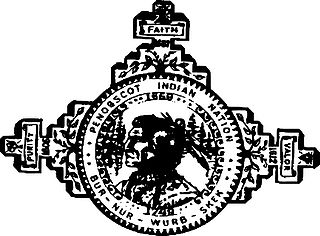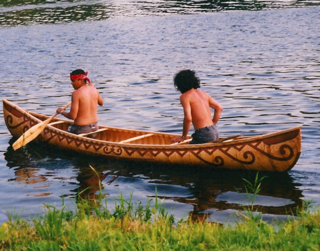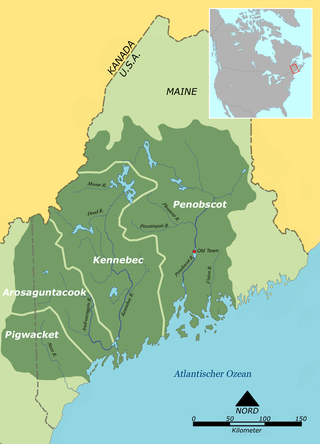
The Abenaki are Indigenous people of the Northeastern Woodlands of Canada and the United States. They are an Algonquian-speaking people and part of the Wabanaki Confederacy. The Eastern Abenaki language was predominantly spoken in Maine, while the Western Abenaki language was spoken in Quebec, Vermont, and New Hampshire.

Swanton is a town in Franklin County, Vermont, United States. The population was 6,701 at the 2020 census. The town includes the village of Swanton.

The Penobscot are an Indigenous people in North America from the Northeastern Woodlands region. They are organized as a federally recognized tribe in Maine and as a First Nations band government in the Atlantic provinces and Quebec.

The Passamaquoddy are a Native American/First Nations people who live in northeastern North America. Their traditional homeland, Peskotomuhkatikuk, straddles the Canadian province of New Brunswick and the U.S. state of Maine in a region called Dawnland. They are one of the constituent nations of the Wabanaki Confederacy.

The Occaneechi Band of the Saponi Nation is a state-recognized tribe in North Carolina.
State-recognized tribes in the United States are organizations that identify as Native American tribes or heritage groups that do not meet the criteria for federally recognized Indian tribes but have been recognized by a process established under assorted state government laws for varying purposes or by governor's executive orders. State recognition does not dictate whether or not they are recognized as Native American tribes by continually existing tribal nations.
The Pennacook, also known by the names Penacook and Pennacock, were an Algonquian-speaking Indigenous peoples of the Northeastern Woodlands who lived in Massachusetts, New Hampshire, and southern Maine. They were not a united tribe but a network of politically and culturally allied communities. Penacook was also the name of a specific Native village in what is now Concord, New Hampshire.

Vincent Illuzzi, Jr. is an American lawyer and politician from Derby, Vermont who formerly served as a Republican member of the Vermont State Senate representing the Essex-Orleans senate district.

Odanak is an Abenaki First Nations reserve in the Central Quebec region, Quebec, Canada. The mostly First Nations population as of the Canada 2021 Census was 481. The territory is located near the mouth of the Saint-François River at its confluence with the St. Lawrence River. It is partly within the limits of Pierreville and across the river from Saint-François-du-Lac. Odanak is an Abenaki word meaning "in the village".

Abenaki, also known as Wôbanakiak, is an endangered Eastern Algonquian language of Quebec and the northern states of New England. The language has Eastern and Western forms which differ in vocabulary and phonology and are sometimes considered distinct languages.

The Missiquoi were a historic band of Abenaki Indigenous peoples from present-day southern Quebec and formerly northern Vermont. This Algonquian-speaking group lived along the eastern shore of Lake Champlain at the time of the European incursion. Today, they are part of the Conseil des Abénakis d'Odanak, a First Nation in Quebec.

The Androscoggin (Ammoscongon) were an Abenaki people from what are now the U.S. states of Maine and New Hampshire. By the 18th century, they were absorbed by neighboring tribes.
State v. Elliott, 616 A.2d 210, is a decision of the Vermont Supreme Court holding that all aboriginal title in Vermont was extinguished "by the increasing weight of history." The Vermont Supreme Court has clarified that its holding in Elliott applies to the entire state.
The Nulhegan Band of the Coosuk Abenaki Nation is a state-recognized tribe and nonprofit organization, called AHA "Abenaki Helping Abenaki", whose headquarters and land are based in Vermont. They are often referred to as the Nulhegan Abenaki Tribe or simply, Nulhegan.
Jesse Bowman Bruchac is an author and language teacher from the Nulhegan Band of the Coosuk Abenaki Nation, a state-recognized tribe in Vermont. He has dedicated much of his life to studying the Abenaki language and preserving the Abenaki culture. He created the first Abenaki language website.

The Cowasuck, also known as Cowass, was an Algonquian-speaking Native American tribe in northeastern North America and the name of their primary settlement.
The Elnu Abenaki Tribe is a state-recognized tribe in Vermont, who claim descent from Abenaki people. They are not federally recognized as a Native American tribe. Vermont has no federally recognized tribes. They are the smallest of Vermont's four state-recognized tribes with 60 members in 2016.
The Koasek Abenaki Tribe is a state-recognized tribe in Vermont, who claim descent from Abenaki people.










